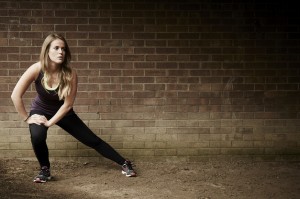A few weeks back I read a really interesting article on the psychological effects of sports injury. Since studying Psychology at university and now working as a Personal Trainer, I’m fascinated by the psychological research around sports injury recovery and personal training. I think it’s so important to take it into account when working with clients in helping them in their journey to recovery.
I’ve currently got a sports injury and have really noticed the impact it’s had on me psychologically and so have been doing a lot of reading into it. A few months back I started getting a pain on the left side of my lower abdominals. Initially it was only painful during exercise that used my lower core and when sprinting but it gradually got worse, became more constant and transferred down into my groin.
I have to admit, at first I didn’t want to accept that there was anything wrong and for quite a while I exercised through the pain and continued with my normal workouts. Eventually I went to see the Physio who told me that I had sprained my left external oblique. I was told that until it had healed I couldn’t do lots of the exercise that I love most- running/sprinting, plyometrics and resistance training with weights. I really had to take it back to basics and restrict my movements, which really got me down and was incredibly frustrating, especially as I had just decided to do a triathlon in July. I felt as if I was going backwards in my training and losing strength that I had worked really hard to build up over the years.
After about a month of sticking rigidly to the rehabilitation programme my oblique was beginning to feel better and the pain had decreased by a considerable amount. With my new found confidence that I was healed and determined not to get behind of my triathlon training, I went to the gym and did some exercise that I really shouldn’t have and that my body just wasn’t ready for yet. As soon as I finished my workout I could feel the same pain again that I had had a month ago. I was so frustrated at myself but it made me realise that I really had to build my body and strength up again slowly and not rush it.
The research that I’ve been reading suggests that following a sports injury people tend to go through the following 5 stages:
1) Denial – you play down the significance of the injury and avoid accepting that it’s there.
2) Anger – as your injury becomes more apparent you may become angry and frustrated at yourself or even those around you. Research shows that this is particularly true for a person who’s self concept and self-identity is heavily based on being ‘an athlete’.
3) Bargaining – following anger, you may try to rationalise to avoid the reality of the situation. For example you may promise yourself to train extra hard if you can recover quickly from the injury.
4) Depression – research shows that not all people go through this stage, but for some when facing the reality of the injury and it’s consequences, they may feel depressed and uncertain about the future.
5) Acceptance and reorganisation – you accept the injury and focus is redirected towards rehabilitation and recovery to enable you to return to normal activity.
If you have a sports injury it’s far better to take it slower and get your body back to functioning optimally again, than it is to rush back into doing what you were before and prolong the recovery time. I think that mentally it’s very important to stay positive by acknowledging even small improvements instead of constantly comparing your strength and fitness levels to what it was before the injury. With the right exercise and rehabilitation programme in place, it’s definitely possible to recover fully and get back to doing the exercise that you enjoy most.

